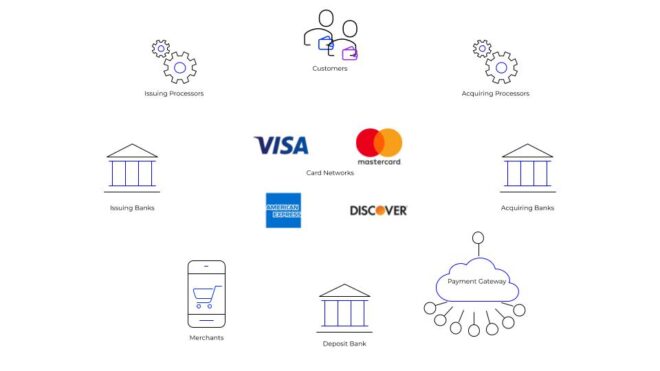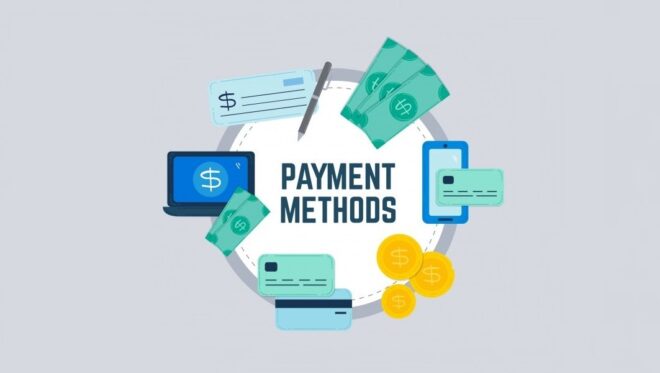Accepting debit or credit card transactions, both online and in person, is made possible by payment processing. As e-commerce and digital transactions grow, payment processing has become essential to businesses. Selecting the appropriate payment processing fee structure and integration can significantly impact your margins. However, choosing the best option can be daunting if you need more knowledge about payment processing for your business.
You can observe various kinds of payment processing, which include Mobile Credit card processing, E-Commerce payment processing, EV charging payment processing, PCI Compliant processing, etc., However, it is necessary to choose the right one by analyzing your firm’s expected needs and targets.
After going through the article, you will comprehend the working mechanism of payment processing, understand the essential terms, and be able to make informed decisions while choosing a payment processor suitable for your business.

Payment processing is a whole system that facilitates businesses to accept electronic payments, which include debit and credit card operations. The payment processing system can be divided into two parts:
1. Payment Gateway:
Securely transmits the customer’s payment information to financial institutions.
2. Payment processor:
It is also called a Payment vendor, which transfers money from the customer to the merchant.
In today’s digital period, the expense processing system is necessary for businesses as most people make digital payments. 50% of all consumer transactions are seen through debit card and credit card transactions, according to the 2021 Diary of consumer payment choice.
To comprehend expense processing, it is essential to understand what occurs each time a customer taps, swipes, or registers their card details.

Payment Processing Terminology
As a business owner or business enthusiast, knowing the basic terminology involved in payment processing using various processes is mandatory. Below are some essential keywords that will help you in the future.
1. POS System:
A point-of-sale system is a blend of hardware and software that supports the public in making transactions. It also assists corporations in tracking deals. Point of sale system hardware like a cash list, card depot, or digital transactions cart is merged with the package to aid the transfer of resources from the buyer to the retailer.
This approach also tracks essential operation data like the date and time of a buying and incorporates any valid retailing tax.
2. An Acquirer:
An acquirer, also called an acquiring bank, is an economic establishment that collects funds from a purchaser’s card network and drops it into a committed trader account. This trader account is where the funds go at the termination of the buying procedure.
The acquirer binds a trader’s costs and proceeds as arbitrators linking the seller and fee card systems.
3. An Issuer:
The issuer or issuing bank is the economic establishment arranging the client’s payment card. It’s also the resource of cash for client trade. The issuer operates as a concierge for the deal. The issuing bank confirms that the invitation for a fee from a vendor is genuine and guarantees that the client has good bucks to face the buying.
The issuer delivers the client’s cash to compensate when this communication is approved.

5 Important Tips For Payment Processing Strategy For Businesses
For both small and large-scale companies, a sound disbursement handling approach is one of the pivotal factors in achieving profitability, endurance, and inclusive achievement. More frequently, enterprises must work on managing their periodical objectives due to an unsuccessful transaction handling technique. Here are a few essential tips that will aid your company in regulating the best strategy for compensation processes.
1. Learn Available Payment Processing Systems
The finest way to progress in handling transactions and your fee processing approach is, to begin with, the fundamentals. This opens with a meeting with your administration crew to evaluate fee managing explanations and how they can run for your corporation. There are two primary forms of payment management approaches. These are expense aggregators and dedicated fee processors.
2. Be Aware Of Various Credit Card Scams
Choosing a decent fee processor for your enterprise often appears down to accepting your firm’s protection requirements. You’ll be required to select a reliable partner that extends a comprehensive selection of scam security characteristics. Varying on your organization model, some deception hazards will be more frequent than others.
Examine recurring transaction deception patterns and determine how they can influence your company, including credit card stumbling, refund scams, and identifying thefts.
3. Identify And Employ Approaches To Avoid Deceptive Charges
With a competent identification of top expense cheat arrangements, examining how payment processors address these problems for their vendors is essential.
You’ll intend to pick a fee processor that suggests a diversity of fraud-prevention and security actions without needing to compensate additional for must-have characteristics.
You can consider having some scam-preventing solutions like Two-Factor authentication, BIN address verification, EMV chips, card verification codes, etc.

4. Make Sure To Have Distinct Payment Methods
Over the past several years, how businesses accept customer payments has evolved by leaps and bounds. If you are pursuing a compliant expense processing solution that will stand the test of time, you must pick a mate that by now puts client liking first, considering fee practices. This guarantees you a payment processor that will take the accessibility of your consumers utterly.
5. Choose A Competent Payment Processing system
Improving your fee processing approach doesn’t limit propping up protection troubles. In picking the appropriate payment processor for your enterprise, you’ll also intend to confirm that you have exceptional central elements & facilities. The processing system you choose should be insightful, customizable, and compact.
Another significant concern when deciding on a fee processor is how effortlessly the arrangement can combine with your other package or provisions.
Conclusion
Undoubtedly, most companies require a fee processor to admit debit and credit cards. Whether you are just commencing your e-commerce warehouse or for an existing business, you want a more operational procedure to manage in-person card operations.
Begin by evaluating your enterprise requirements. Weigh up the number of your online or in-person sales and the size of each. Identifying the responses to these queries can assist you in determining how much you will spend on fee processing and what packages you will require.



